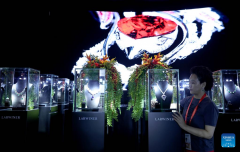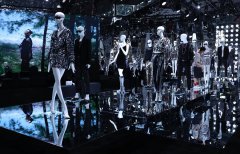China 2008 vs 2022: Richer, stronger, more confrontational
Richer, more heavily armed and openly confrontational, China has undergone history-making changes since the last time it hosted the Olympics, in 2008
January 26, 2022, 4:14 AM
6 min read
Share to FacebookShare to TwitterEmail this articleFILE - Chinese authorities test fireworks ahead of the Aug 8 start of the Olympic Games on Tiananmen Square in Beijing, China, Saturday, Aug 2, 2008. Richer, more heavily armed and openly confrontational, China has undergone history-making change since the last time it was an Olympic host in 2008. (AP Photo/Ng Han Guan, File)
BEIJING -- China has undergone history-making change since the last time it was an Olympic host in 2008: It is richer, more heavily armed and openly confrontational.
As President Xi Jinping’s government prepares for February’s Winter Olympics, it has greater leverage to exert influence abroad and resist complaints from the United States and other governments over trade, technology theft and its treatment of Taiwan, Hong Kong and China’s Muslim minorities.
The economy is three times larger today. The ruling Communist Party is using that wealth to try to become a “technology power” and is spending more on its military than any country other than the United States.
“2008 was a turning point,” said Jean-Pierre Cabestan, an expert on Chinese politics at Hong Kong Baptist University. “That was the beginning of China’s assertiveness.”
As fireworks exploded over Beijing in August 2008, China was about to overtake Japan as the No. 2 global economy. The ruling party celebrated with the most expensive Summer Games to date.
Foreign media dubbed it China’s “coming out party,” echoing the Tokyo Olympics in 1964 that symbolized Japan’s recovery from World War II. After three decades of keeping its head down to focus on development, Beijing was ready to emerge on the global stage as an economic and political force.
The ruling party declared its more assertive stance in 2012, the year Xi took power, in a document that called for “more strategic rights,” military status and a bigger global role.
Xi’s government sees its system of one-party dictatorship under threat and accuses Washington of trying to deny China its rightful role as a global leader. The ruling party is tightening control over society and business and using internet filters and other censorship to shut out what it deems unhealthy foreign influences. It is doing more to intimidate Taiwan, the island democracy Beijing says belongs to China.
“You can see that China is forced by the United States and its allies such as Australia, Japan and Britain to do so,” said Shi Yinhong, a professor of international relations at Renmin University in Beijing.
Xi is seeking to cement his control over the country. He is expected to use key political meetings late in 2022 to try to break with tradition and stay in power for a third five-year term as head of the ruling party. Earlier, he had the Chinese constitution changed to get rid of term limits on his role as president.
Once “more open to the outside world,” China now is “much more paranoid,” Cabestan said.
Beijing has sent warplanes in growing numbers to fly near Taiwan. It is pouring money into developing nuclear-capable missiles that can hit the United States and aircraft carriers and other weapons to extend its military reach beyond China’s shores.
Chinese leaders believe, Shi said, that they need to defend themselves on several fronts: a tariff war launched by then-President Donald Trump in 2018; curbs on access to U.S. technology; and military alliances involving Japan, Australia and other governments to counter Beijing's claims to the South China Sea and other territory.
“If there is a bad relationship between China and another country, it is because the other country harms China,” Shi said.
In 2008, Summer Games preparations included a $43 billion makeover of the Chinese capital. The party built the eye-catching Bird's Nest stadium and other Olympic venues, installed new subway lines and upgrading roads. Exercise equipment was installed in thousands of public parks across China.










